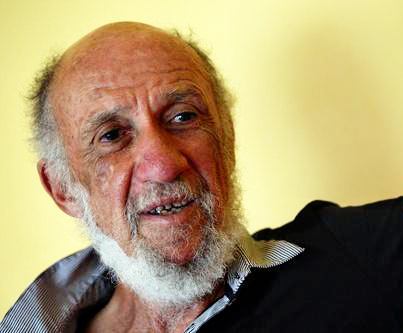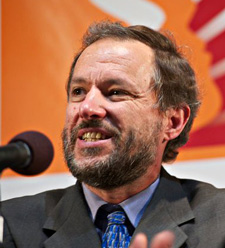Archive for October, 2014
TFF PressInfo 281: Instead of bombing IS (Part A)
By Jan Oberg
This two-part article offers a pro-peace perspective on the present war on ISIS in Iraq and Syria.
First some principles to stimulate another discourse, another way of thinking that is not militarist – and then some concrete proposals – 27 in all for your deliberation, discussion with friends and perhaps to share through your social and other media.
Neither war nor doing nothing
The principle of ”An eye for an eye will one day make the whole world blind” – said Mohandas K. Gandhi who was born on October 2 145 years ago. Since then, human civilisation has not advanced much when it comes to handling conflict.
Let’s recognise that it is a difficult situation – the Middle East is in a mess and the West is deeply co-responsible if you look at the last roughly 100 years – Sykes-Picot, Balfour, coup d’etats, occupations, bombings, bases, oil greed etc.
So, there are no easy solutions.
However, three simple principles will help us all:
A) Be aware of the West’s co-responsibility,
B) Don’t make everything even worse – and
C) Remember that violence begets hate, wish for revenge and more violence – blowbacks.
Unfortunately, A to C is totally ignored by the bombing nations – the US, France, Britain, Belgium and my native Denmark together with some small Arab states which paradoxically have financed ISIS – Al-Qaeda in Iraq – for years.
It is easy to be for war. Read the rest of this entry »
Controlling ISIS without bombing
By Jonathan Power
A Western viewpoint (courtesy of Aubrey Bailey): “Some of our friends support our enemies, and some of our enemies are our friends, and some of our enemies are fighting against our other enemies whom we want to lose, but we don’t want our enemies who are fighting our enemies to win.
If the people we want to defeat are defeated they might be replaced by people we like even less. And all this was started by us, the West, invading a country to drive out terrorists who weren’t actually there until we went to drive them out”.
Those are the conundrums that President Barack Obama and his Western and Arab allies are facing in trying to defeat ISIS.
Well, if the saying that “My enemy’s enemy is my friend” is an Arab one then the West has its: “When you are in a hole stop digging”.
The hole digging has been going on since President Jimmy Carter, persuaded by his National Security Advisor, Zbigniew Brzezinski, provided sophisticated armaments to the Mujahidin fighting the invading Soviet army in Afghanistan back in the 1980s. Not surprisingly the arms of the Mujahidin fell into the hands of the resurgent Taliban which protected Al Qaeda. Read the rest of this entry »
Vi skulle have gjort noget af dette i stedet for krig…
Af Jan Øberg
Åbn øjnene for muligheder istedet for “Øje for øje”
Princippet om øje for øje vil en dag gøre hele verden blind – som Gandhi, der den 2. oktober fødtes for 145 år siden, så klogt sagde.
Det er imidlertid dét princip den danske regering, et stort flertal i Folketinget og efter sigende 62% af den danske befolkning nu følger når Danmark går i krig for 5. gang på 15 år.
Danmark bomber sammen med de store NATO-lande USA, England og Frankrig og så nogle arabiske småstater. Ud af 193 lande i verden!
Som kritiker af en militaristisk – men ikke aktiv – udenrigspolitik får jeg ofte spørgsmålet hvad Danmark (jeg siger ikke ”vi”) i stedet skulle have gjort.
Svarene forudsætter dels en anden måde at tænke på og en vis uddannelse og dels nogle konkrete ideer, der skulle kunne implementeres.
Her er nogle hurtigt nedfældede svar på de to dimensioner – ingen rangordning, tingene er alle vigtige: Read the rest of this entry »
The Environment: Very holistic, very dialectic
By Johan Galtung
“Trees won’t save the planet” is the title of an article in INYT (21-22 Sep 2014) by Nadine Unger, professor of atmospheric chemistry at Yale University. Her thesis: The conventional wisdom–that planting trees serves carbon capture–is wrong; it is all much more complex.
Photosynthesis is only one factor. Another factor for global warming is how much of the solar energy is absorbed by the earth’s surface and how much is reflected. Trees, being dark, absorb; the net balance may be chilling in the tropics and warming elsewhere.
But there is more to it. Trees emit VOCs, “volatile organic compounds”, for their own protection. Mixing with pollution from cars and industry “an even more harmful cocktail of airborne toxic chemicals is created”, producing methane and ozone. Research at Yale seems to indicate that this affects global climate on a scale similar to surface color and carbon storage capacity.”
Trees and soil also breathe oxygen and release CO2. The Amazon forest produces oxygen during the day and reabsorbs at night; a closed system. Moreover, eventually trees die or burn and “the carbons finds its way back into the atmosphere”. Read the rest of this entry »
4+ logics of living together on Planet Earth
By Richard Falk
It is misleading to describe ‘world order’ as consisting exclusively of sovereign territorial states. This misimpression is further encouraged by the structure of the United Nations, whose members are states, and only states. The UN was established in 1945 in the aftermath of World War II, reflecting a West-centric orientation that emerged at the time, quickly morphing into the Cold War rivalry between the two states that were geopolitically dominant and ideologically antagonistic: the United States and Soviet Union.
Even in the UN, however, this surface allegiance to statism is misleading. The geopolitical dimension was highlighted in the UN Charter by conferring a veto power on five winners in the recently concluded war, which amounted to the grant of a right of exception with respect to international law.
But there are differences in hard and soft power that make the interactions among states within the UN exhibit more inequality than is suggested by this still prevailing Westphalian myth of the equality among sovereign states. Some states contribute far more to the UN budget than others, and their views carry more weight; others are richer, bigger, more informed about some issues, are better at lobbying for support, and some play above their diplomatic weight by clever political maneuvers. And there are several kinds of non-states active behind the scenes that exert varying degrees of influence depending on the subject-matter.
Global policy is mainly shaped outside the UN by a bewildering array of formal and informal actors that participate in a bewildering variety of ways in international life. The world economy is substantially controlled by business oriented alignments such as the World Economic Forum that meets annually in Davos, Switzerland, or the gatherings of economically powerful states grouped together as the G-7, later becoming the G-8, and more recently the G-20 to accommodate shifts in trade and investment patterns, and give recognition to such new alignments as the BRICs.
As such, the shorthand designation of world order by reference to the 1648 Treaties of Westphalia that brought the Thirty Years War to an end serves as a convenient starting point for understanding the way authority and power are deployed in the world.
Yet it must be supplemented by the recognition that Read the rest of this entry »
After ‘Protective Edge’: What future for Palestine and Israel?
By Richard Falk
The 50-day Israeli military operation that killed over 2100 Palestinians, wounded another 11,000, and undoubtedly traumatized the entire Gazan population of 1.7 million also took the lives of 70 Israelis, of which 65 were soldiers. This last violent encounter has ended without a clear victory for either side.
Despite this, Israel and Hamas are each insisting that ‘victory’ was achieved. Israel points to the material results, tunnels and rocket sites destroyed, targeted assassinations completed, and the overall weakening of Hamas capacity to launch an attack. Hamas, for its part, claims political gains, becoming far stronger politically and psychologically in both Gaza and the West Bank than before the fighting began, refusing to give in on the basic Israeli demand of the ‘demilitarization’ of Gaza, as well as further tarnishing Israel’s international reputation.
The UN Human Rights Commission has taken what for it is an exceptional step of appointing a commission of inquiry to investigate allegations of war crimes. The fact that William Schabas, a renowned expert on international criminal law, especially on the crime of genocide, was selected to chair the investigation is of great symbolic significance, and potentially of major relevance to the ongoing legitimacy struggle being successfully waged by the Palestinian people. Read the rest of this entry »
U.S. leadership against Russia crippled by its own hypocrisy
By Stephen Zunes
Washington’s major limitation towards Russia is not a lack of military leadership, but a lack of moral leadership
The fragile ceasefire between the U.S.-backed Ukrainian government and Russian-backed rebels could help pave the way to a peaceful resolution to the conflict—or simply postpone a worsening of the crisis. Unfortunately, Washington’s leadership of international efforts against Russian aggression has been severely compromised by its own hypocrisy and double standards.
As with Russia in eastern Ukraine, the United States has a long history of arming, training, and even providing personnel in support of rebel groups in such countries as… Continue reading here.
May peace prevail on earth – not only on Peace Day but every day
By Johan Galtung
What a good idea, this day! To reflect, take stock, to enjoy peace, to deplore non-peace.21 sep day of peace
And the first reflection is this: peace is the normal condition of humanity, just like health. There is so much plain, simple, decent behavior around, so much mutual aid, a helping hand, companionship, friendship, good neighborhood when bad luck strikes at its worst. And we sense mutuality, unquestioning reciprocity; not always but mostly.
Go to an airport, stay close to where they come out, arrival, and are met by their nearest–watch the embraces, the warmth, the eyes glittering, the smiles, laughter. There we are. Harmony, resonance–with the occasional deep, joint sadness, sorrow; something has struck.
Go to a restaurant, not too stiff, formal–more ordinary eatery. And you see it again, the pleasure, food, drinks, togetherness, the shared pleasure – the jokes, the smiles.
Most of the time – then some incident, issue arises. Read the rest of this entry »





